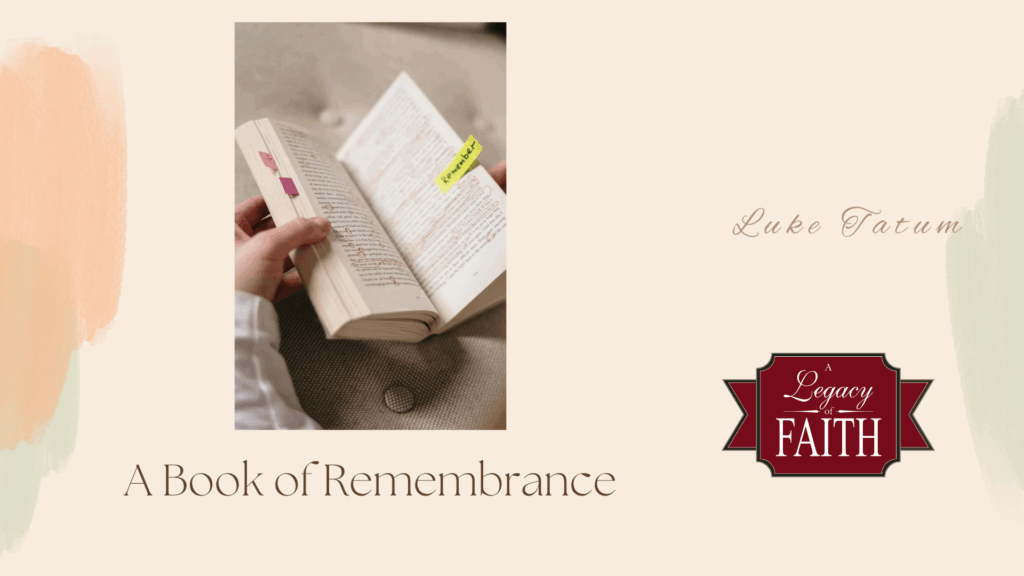A Book of Remembrance
The Book of Malachi has been reduced to a footnote in many of the Old Testament surveys I have seen, heard, and read. It’s the last book of the Old Testament, both chronologically and canonically; it falls in step with the same themes common to the other Minor Prophets; it mentions the coming of “Elijah” (aka John the Baptist) before the arrival of the day of the Lord. Very few overviews go much deeper than this, and it’s hard to blame them. In a sense this last word from God before 400 years of silence is difficult to understand, especially given its unique place within the scope of Scripture. At its heart, though, the oracles of Malachi are primarily concerned with reminding the people of God what true righteousness looks like – a reminder to which they must hold close in the absence of inspired writings for the next few
centuries.
One of the most familiar symbols used in this book – especially for Christians reading through the lens of the New Testament – is the symbol of the Lord’s book of remembrance. At the end of chapter 3, Malachi describes the creation of a book in which are written the names of all of those “who feared the Lord and esteemed His name” (3:16). God claims ownership over these, saying that He will hold them in high esteem and spare them from the coming judgment “as a man spares his son who serves him” (3:17). By identifying His people in these ways, God creates a distinction between the righteous and the wicked that he hopes will be seen by others as He continues to offer opportunities for the people to turn and serve Him (3:18). Readers familiar with the New Testament will no doubt draw a parallel between this book and the Book of Life described in Revelation, in which are written the names of those who were faithful to their Lord and spared from judgment as a result (Revelation 20:11-15).
Of course, placing this symbol back into its context is even more revealing. For the bulk of this chapter, God speaks through Malachi about the injustices committed by Israel and its leaders. Among other offenses, the Lord finds His people guilty of oppressing those who are in need (3:5), abandoning the practice of the Mosaic Law (3:7), withholding their physical and spiritual offerings from Him (3:8-9), and testing God’s patience by claiming that it is vanity to serve Him (3:13-15). The once faithful nation has been drawn away by a multitude of vices, and if they are going to survive centuries of silence from God and be prepared for the coming Messiah, they must decide to pursue true righteousness again. Thankfully, at least some of them do so: the creation of the book of remembrance is prompted after “those who feared the Lord spoke to one another” (3:16), apparently about the things that had gone wrong and the ways in which they could still be made right. The core principle behind this passage is this: The identification of the righteous by God follows the decision on mankind’s part to pursue that identity.
This is not an attempt to use Malachi 3 to downplay the role of grace and mercy in the salvation of mankind. The path illustrated by Ephesians 2:8-10 of salvation coming “by grace through a faith that works” holds true throughout the Bible. It is also the case, however, that if those who claim to be the people of God are not making the active decision to pursue their identity as His people, that identity will not be completed in them. No one has ever lived his or her life as a faithful Chrsitian by accident, and the passivity of doing everything the way it is done because that’s how it’s always been done stands in stark contrast to the picture painted in this passage. Those who are righteous before God are those who are active in their decision to follow Christ – a decision to be charitable towards others, committed to practicing God’s law, cheerful in our offerings of praise, and confident in the value of our relationship with the Lord. These are the traits of those whom God will choose to remember and claim as His own to the
very end.
It is a great comfort to know that “the Lord knows those who are His” (2 Timothy 2:19) and that He is devoted to our good as His children. The wonder of God claiming ownership over sinful men is the result of a love I will never understand this side of eternity. So, too, is the wonder of being invited to share in the ministry of Christ Himself and be transformed into His image through our faithful relationship with Him. May we as the church be challenged by this passage to remember our decision to follow God, and to rejoice in His decision to claim us as His own to the very end.
“For our sake He made Him to be sin who knew no sin, so that in Him we might become the righteousness of God.” ~ 2 Corinthians 5:21
AUTHOR: Luke Tatum
